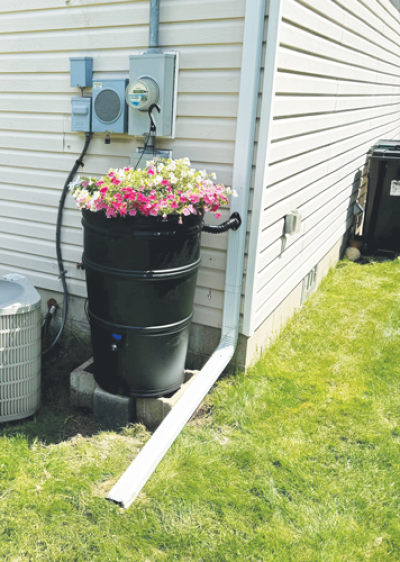
Residents within the George W. Kuhn Drainage District are encouraged to install green stormwater infrastructure through RainSmart Rebates. Birmingham residents embraced the RainSmart Rebates program by installing rain barrels.
Photo provided by Stephanie Petriello
BIRMINGHAM — Residents within the George W. Kuhn Drainage District are eligible to apply for RainSmart Rebates up to $2,000 to put toward sustainable practices, such as planting native trees, rain barrel installation and a rain garden.
Not every resident in Birmingham resides in this district. In order to check eligibility, there is an interactive map on the Oakland County Water Resources Commissioner’s Office website that can help determine whether a resident is in the George W. Kuhn Drainage District. This program is only for new projects.
According to Oakland County’s website, the George W. Kuhn Drainage District serves all or part of 14 communities. For more information, visit oakgov.com and search for “George W. Kuhn Drainage District.”
The rebates are part of a two-year pilot program. The program’s overall budget was set at $200,000 and was split between two years — $100,000 this year and $100,000 last year.
Last year, about $60,000 went towards homeowners’ projects. However, funds also went towards the RainSmart Rebates Equity Grant. About $25,000 from last year is rolling over to this year, making more projects possible.
How to apply
The first step in applying for a RainSmart rebate is filling out an application on the WRC website. The next step requires a site assessment, which costs $25 and is conducted by the Clinton River Watershed Council.
After receiving approval on all requested designs, the homeowner can purchase and install their project(s). Then, the homeowner can submit a rebate request with all of the required forms, receipts and photos. After these steps are completed, the homeowner will receive the rebate.
Residents who can’t afford to pay for the supplies and installation necessary for a project can apply for the RainSmart Rebates Equity Grant when filing out an application. The funds are provided on a first-come, first-served basis.
Alignment with city goals
A goal listed in the “Birmingham Green: Healthy Climate Plan” reads, “Increase capacity for the infiltration or capture of an additional 500,000 gallons of stormwater per rain event by 2035.”
Through the first year of this rebate program, the city was able to increase the storage capacity by almost 800 gallons per rain event.
“I’d call it a pleasure to have been a part of that development process, especially based on how good the program turned out,” Birmingham Planning Director Nicholas Dupuis said.
More about the program
Stephanie Petriello, who is an environmental planner for the Oakland County Water Resources Commissioner’s Office, said the basis of this program is “to promote the use of green infrastructure and talk about the benefits.”
Last year, 53 Birmingham residents applied to receive RainsSmart Rebates. Of those applicants, 16 had a site assessment, with only nine completing at least one project.
For the whole district, over 500 people applied, around 200 had a site assessment and 135 completed at least one project.
Petriello said eligible applicants are accepted on a first-come, first-served basis, as long as funding is available. She said about half of these applicants were invited to have a site assessment, but that it is the responsibility of the homeowner to sign up for one.
Petriello said they hope to decrease the number of people who discontinue following through with the program after they submit their application. She said that with the data they have from last year, they can accept more people upfront and try to get them through the program faster.
“The pilot is focused on the district that has a combined sewer system. So any water that we can prevent from getting to those combined pipes is water that we don’t have to treat at the treatment basins,” Petriello said.
The continuation of this pilot program is dependent on finding a sustainable long-term funding source. The pilot program is funded by the George W. Kuhn Drainage District.
 Publication select ▼
Publication select ▼
























